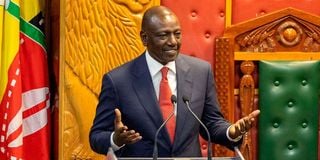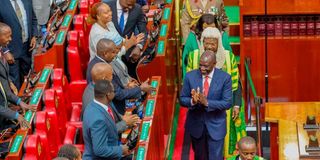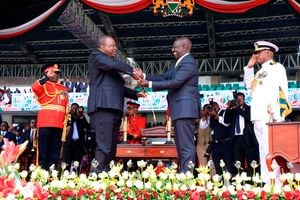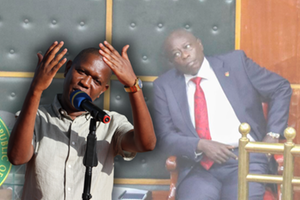
President William Ruto delivers the State of the Nation Address at Parliament Buildings in Nairobi on November 21, 2024.
When Jubilee Secretary-General Jeremiah Kioni in November 2022 warned Kenyans will suffer because they will get a raw deal from their leaders with President William Ruto keen on having absolute control of Parliament, it may have passed as an opposition still in denial.
The former Ndaragwa MP said the President had succeeded in capturing Parliament, making it difficult for the opposition to play its oversight role and watering down checks on the Executive.
“Having seen what is happening in Parliament, it is clear that Kenyans are on their own. It is likely that our MPs are for the highest bidder. It is no longer about party affiliation. You cannot rule out the aspect of money,” said Mr Kioni.
True to Mr Kioni’s premonition, the 13th Parliament could go down in history as one that openly became an extension of the Executive, turning it into its playground.
The easy passage of the controversial Finance Bills 2023 and 2024 stands out as a sore thumb on what a stranglehold of Parliament can do with MPs turning into voting machines despite public outrage by the electorates.
Several unconstitutional and controversial bills were hurriedly passed in both the Senate and National Assembly despite reservations from Kenyans culminating in the invasion of Parliament on June 25, 2024, with Gen Zs expressing their disappointment with MPs.
Some of the bills include the Water (Amendment) Bill, the Affordable Housing Bill, Social Health Insurance Fund Bill, and Health Promoters Bill.
A November 2024 report by the Africa Centre for Open Governance (Africog) indicted Parliament for being cosy with the Executive and failing to hold the government to account.
The report noted that President Ruto has managed to “buy” a substantial number of opposition MPs, thereby creating an unbeatable majority in the National Assembly and the Senate.
But even then, the report said, opposition lawmakers have willingly “gone to bed” with the Executive and work with their counterparts across the aisle when it suits them.
Members of President Ruto’s cabinet have been accused of ineptitude and graft, but parliament has not used its constitutional powers to hold errant cabinet secretaries to account.
“There is instead an indication that Ruto’s hold over Parliament means it is serving less and less as a check on the Executive,” said Africog Executive Director Gladwell Otieno.

President William Ruto acknowledges greetings from Members of Parliament after he delivered his State of the Nation Address at Parliament Buildings in Nairobi on November 21, 2024.
“With a pliant parliament, Ruto seems set to pass any legislation he wants - including tax hikes and the tough measures necessary for him to try and meet the revenue targets set by his government’s financiers,” she added.
To demonstrate a Parliament under capture by the Executive, the report cited how MPs approved all President Ruto’s Cabinet nominees despite 10 out of the 23 members of the original Cabinet being challenged on integrity grounds, mechanically dismissing substantive petitions by the public and civil society documenting reasons for ineligibility under Chapter Six of the Constitution.
Homa Bay Senator Moses Kajwang’ says Parliament has failed to assert its independence where the lines between the minority and majority have become blurred with the former speaking like members of the executive rather than leaders of the legislature.
He agrees that the August House is an epic fail with even the appearance of CSs before Parliament becoming more ceremonial and less useful.
The third-term senator adds that one of the biggest follies is the constituency development fund (CDF) and national government affirmative action fund (Ngaaf).
“The funds give MPs a false sense of financial security and political patronage. They are no longer motivated to speak in the House and some have turned into contractors. You cannot oversight a government when you are doing business with it,” says Mr Kajwang’.
“Parliament has even failed to secure a sufficient budget for its operations. Committee operations are paralysed and this will affect oversight.”
Kisii Senator Richard Onyonka agrees saying President Ruto has been using soft power by rewarding MPs with funds and trips to vote for government positions whether it is illegal or not.
He adds that Kenyan socio-political and economic infrastructure is inherently broken and it is only MPs who can fix the issues affecting Kenyans.
“You don’t expect somebody who is being rewarded with favours to turn against their masters even if he is breaking the law. That is where we are,” avers Mr Onyonka.
“We are pretending like the three arms of governments are independent yet they are not. The same problem seen in Parliament is also in the Judiciary,” he added.
Nonetheless, Saboti MP Caleb Amisi says achieving an independent Parliament is a tall order because Kenya’s presidential system dictates that MPs follow party positions, which includes supporting the government if they are from the President’s party.
Consequently, he notes that going against a party's position then comes with repercussions because once a party has pronounced itself on a certain matter, an MP is supposed to follow it or face the music.
“As long as the government has the majority, Parliament will look like the Executive because most members will be going by the government’s position. If Kenyans want a completely independent Parliament, they need to elect completely independent candidates from the top to the bottom,” says Mr Amisi.
Kakamega Senator Boni Khalwale avers that there should never be a blanket condemnation of MPs because there are some who have stood their ground but rarely have their way because Bills are approved in Parliament by a majority.
“It is not accurate to blame MPs wholesome because bills go through by majority and there are many MPs who remain in minority whose thinking does not materialise because they did not get the numbers so the blame should be individual,” says the Senate Majority Whip.
However, he adds that the blame should not be on MPs alone but also on Kenyans because they are the ones who voted for the MPs.
“If they are not satisfied with the quality of work the lawmakers are churning out, they should always remember that they voted for them and they say, voters get the leaders that they deserve.”
Nevertheless, Senate Majority Leader Aaron Cheruiyot was bullish, saying they campaigned together with the President making promises to the people and they were allocated responsibilities where the Head of State was to lead the Executive and him to represent his interest in Parliament.
“If there is legislation that has been brought before this House and it agrees with the manifesto upon which our party campaigned, should I delay or expedite that legislation?” posed the Kericho senator.
“That explains part of what I am saying ails our country; where you find people have become experts in everything. You want to be an expert in health matters, education policy and comment on the legislature,” he added.
But this is how the capture of Parliament by the Executive began.
After narrowly winning the presidency in the 2022 elections, President Ruto embarked on consolidating his stranglehold of Parliament.
Enjoying a slim majority in both Houses of Parliament thanks to a controversial ruling by Speaker Moses Wetang’ula (a Kenya Kwanza Alliance principal), the United Democratic Alliance party leader was not going to take chances.
With the opposition still smarting from a slim loss in the presidential race and Speaker Wetang’ula’s ruling, the ruling alliance's legitimacy was standing in quicksand.
Not resting on his laurels, President Ruto, immediately after being sworn in, began plotting on how to secure an absolute majority in the National Assembly in order to guarantee an easy time passing key legislations and government business.
Former Deputy President Rigathi Gachagua at one time said the government had given itself up to December 31, 2022, to achieve the plan.
The scheme involved wooing into their fold MPs from parties allied to Azimio la Umoja One Kenya coalition, capitalising on the push and pull in the Raila Odinga-led outfit, as well as lawmakers elected on Independent tickets.
The plan worked with the President managing to lure most MPs from the opposition to his fold to help push the ruling coalition’s agenda in Parliament.
The opposition, which had accused Parliament of playing to the whims of the Executive, disregarding its oversight role and going to bed with the government, is now one of the strongest defenders of the ruling regime.
Former premier Raila Odinga would attack the President over his charm offensive on his lieutenants, alleging that the Head of State is hell-bent on establishing a “one-party State”.
He pointed out a trend of an overreaching Executive power into Parliament where separation of power is not respected, questioning the neutrality of Speakers Wetang’ula and Amason Kingi (Senate).
The conduct of the two speakers has been a topic of discussion with accusations of rubber stamping any business from the government, turning Parliament into an extension of the Executive.
Mr Odinga said the August House has continuously passed laws sponsored by the government failing to defend the welfare of the electorates, adding that the current MPs had been held hostage.
At one time, Azimio senators walked out of a Senate housekeeping retreat protesting the conduct of Speaker Kingi, accusing him of being the ruling regime’s puppet by aiding in bulldozing through unconstitutional bills pushed by President Ruto’s administration.
At the time, Minority Leader Stewart Madzayo criticised the former Kilifi governor for demonstrating open bias while presiding over government business.
The development has seen several government bills approved hurriedly by Parliament leading to walkouts by the minority side or court cases challenging the legislation.
“We have seen the emergence of a phenomenon where shortcuts are taken to fast track government bills, limit debate on the floor,” he said.
Vihiga Senator Godfrey Osotsi said Parliament has found itself at a point where it has deviated from representing the interests of the people to that of individuals.
“Parliament is gradually being taken over by the Executive. It is not just in the Senate but in the National Assembly too,” Mr Osotsi said.
But towards the end of 2024, President Ruto would drive the last nail in the coffin of any opposition in the country after managing to strike a deal with his political nemesis, the former premier, following a bitter fallout with his deputy, Rigathi Gachagua.
The outcome saw some ODM leaders incorporated into Dr Ruto’s administration in what has come to be known as a broad-based government, with the capture of Parliament by the Executive coming full circle to the days of Handshake.
A beneficiary of the current mongrel arrangement is Suna East MP Junet Mohamed who was elevated to a minority leader replacing Opiyo Wandayi (Ugunja) who had been appointed into Dr Ruto’s government as Energy and Petroleum cabinet secretary.
The opposition MP has suddenly turned into a fierce defender of the ruling regime, “seeing no evil” in the government, and becoming outspoken supporters of his government.
On December 3, 2024, when he accompanied the President on his development tour of the Coastal region, the MP waxed lyrical on how the government was “the best thing since sliced bread”.
“Congratulations Mr President for the work you are doing as things are progressing well. Debts are being paid and macro-economic policies being implemented are helping and we can see light at the end of the tunnel,” said Mr Mohamed.
This was a far cry from a lawmaker who had in November 2022 scathingly described the current regime as illegitimate and using public resources to settle political scores.
He added that Parliament, which was supposed to hold the Executive accountable, was operating from “the lawns of the State House”.
Former nominated MP John Mbadi, now Treasury CS, had said Parliament had lost its independence pointing to how the President often dictates the House to approve government bills including the SHIF and the Hustler Fund.
“We cannot have a situation where the President attends a rally and orders Parliament to pass a bill by a certain day. It is embarrassing,” said the ex-ODM chairperson.











